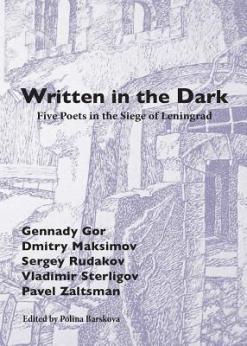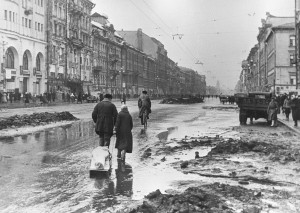My Review:
 The official, state sponsored view of the Siege of Leningrad was one of heroism and valor and any piece of writing whether it be fiction, non-fiction or poetry that did not align with the Soviet vision of the Siege was suppressed. The dark and shocking works of the five poets in this collection were written in secret and not uncovered or published until many years after the war and after the fall of the Soviet Union. The Nazi siege of this Russian city lasted from September 1941 until January of 1944 with an estimated death toll reaching nearly 1,000,000 lives. The Soviet Union propogated a version of this event that portrayed stoic Russians valiantly enduring the long, German offensive; the brutality and horror that occurred in the city were buried with those who died during the Siege. In the introduction to the collection, Polina Barskova writes about the official, state approved, Soviet poetry that was allowed to be published about the Siege:
The official, state sponsored view of the Siege of Leningrad was one of heroism and valor and any piece of writing whether it be fiction, non-fiction or poetry that did not align with the Soviet vision of the Siege was suppressed. The dark and shocking works of the five poets in this collection were written in secret and not uncovered or published until many years after the war and after the fall of the Soviet Union. The Nazi siege of this Russian city lasted from September 1941 until January of 1944 with an estimated death toll reaching nearly 1,000,000 lives. The Soviet Union propogated a version of this event that portrayed stoic Russians valiantly enduring the long, German offensive; the brutality and horror that occurred in the city were buried with those who died during the Siege. In the introduction to the collection, Polina Barskova writes about the official, state approved, Soviet poetry that was allowed to be published about the Siege:
The “exemplary” Siege self presented to the world in this kind of literature was that of the stoic Soviet soldier. Even women, children and the elderly were depicted as warriors and likened to the city’s monuments —carved of marble and decorated with gold. It is these ubiquitous monuments that told, as I recall from my Leningrad childhood, the retouched story of the Siege—filled with hypocritical pathos and barren of the horrific truth. The truth, however, does emerge, sooner or later.
During the era of perestroika, poetry that was written during the Siege and suppressed by the Soviet regime began to emerge and to give the world a more accurate glimpse into the suffering and death that was thrust upon this city during World War II. The poets in this collection include Gennady Gor (1907-1981), the artist and film set director Pavel Zaltsman (1912-1985), the philologist Dmitry Maximov (1904-1987), the avant-garde painter Vladimir Sterligov (1904-1973), and the poet-philologist Sergey Rudakov (1909-1944).
The most brutally shocking poems in the book are written by Gennady Gor who became a well-known scholar, science fiction writer and collector of the art of Northern ethnicities when the war was over. There is an emphasis throughout his poems on cannibalism which is believed to have been widely practiced during the height of the Siege. Even carrion birds are deprived of any meals because there simply is nothing left:
I ate Rebecca the girl full of laughter
A raven looked down at my hideous dinner.
A raven looked down at me like at boredom.
At hwo slowly this human was eating that human.
A raven looked down but it was for nothing.
I didn’t throw it that arm of Rebecca.

Lenigraders on Nevsky Prospect during the Siege, 1942. RIA Novosti archive, image #324 / Boris Kudoyarov via Wikimedia Commons
Gor’s poems are obsessed with rotting and cold body parts, even when they are not being eaten. His emphasis on descriptions of body parts evokes the images of citizens lying in the streets, completely forgotten. His description of the pervading darkness reminds us of the black nights endured by the citizens because they were constantly under attack by the Germans. Even the moon is not welcome under these horrendous circumstances. Gor reveals the mental and emotional toll that this Siege took on its survivors, which stark details were forbidden to be written about in the official, Soviet poetry:
With a shock wave in my ears,
A cold moon in my soul,
I am a shot to insanity. I am both
Check and mate to myself. I am mute. Now I
Am nothing and running toward nothing.
Now I am no one’s and rushing to no one.
A shock wave in my mouth,
A cold moon in my dark,
A leg in my corner, an arm in my ditch,
The eyes that fell out of my sockets,
A finger forgotten in one of the clinics,
An unneeded moon in my dark.
After reading Vladimir Stergilov’s poems I was stunned that this man could not only survive the Siege, but also serve at the Leningrad Front, and then after the war return to this city where he became a successful artist in the underground, unofficial, avant-garde world of art. One wonders how could a man who wrote this poem go on after these experiences:
Raised a spoon to your lips—Death
Stretched out your hand to hello—Death
Saw a little goldfinch—Death
On the branch of a little leaf—Death
On a walk with your friends—Death
Looked at the cabbage on the plate—Death
Seeing your friends off, two of them—Death
Happened to glance to the side—Death.
Stergilov’s use of epistrophe with the word “Death” underscores the sheer terror that hovers over the most mundane, daily activities like eating or greeting a friend or walking in the park.
One final poet in the collection that stands out is Sergey Rudakov who elevates the themes of his poetry to encompass the larger event that is the destruction of Leningrad, a once proud and prosperous stronghold of the Russian state. He is the only one of these five poets who mentions his native city repeatedly in his Siege poems. In this first excerpt there is a feeling of nostalgia for his beloved city which is no longer recognizable to him:
The poor heart is both happy and unhappy
To recognize in searchlight crosses, to the west,
The native sky of Leningrad.
In the next poem in which he mentions the city there is an emphasis on the wasteland that his city has become with its empty apartments, streets and shops:
In the wasteland of Leningrad
Clocks still tell time somewhere.
But do not trust their wheels’ gait
Nor the arc of their springs.
Blind Charon keeps idle:
There are no normal burials.

Leningraders on Nevsky Prospect during the Siege, 1942. RIA Novosti archive, image #324 / Boris Kudoyarov via Wikimedia Commons
And in one final poem he uses the city’s former name, perhaps in an attempt to remember what a great city it once was before the Germans invaded. There is also an emphasis in this poem on the scores of unburied dead that were strewn on the city streets:
x
…In those far off years
Which future grandchildren
Will never come to know
In pale accounts of science,
Those days immemorial
Were lost in dreadful frosts.
In makeshift huts, the futile fires
Warmed soups of glue
And glucose for the living.
The dead outnumbered coffins.
The rout of Petersburg abandoned
Without a burial their own.
As difficult as these poems are to read, they are a reminder of the remarkable resiliency of the human spirit. Rudakov aptly writes that future grandchildren will not come to know the true brutality of the Siege because as time slips by, so do our memories fade. Our minds, our hearts, our souls have the greatest capacity to overcome the most unspeakable tragedies; this collection of poems puts into perspective the seemingly trivial problems that we might have on a day to day basis—trivial, at least, in comparison to surviving the Siege of Leningrad.
For more information on each of the authors of the collection as well as the editor visit Ugly Duckling Presse.



Always nice to get a new perspective on historical events. And your attention to formal details helps the “poetry” come through the grim content.
LikeLike
Thanks so much. This is quite a remarkable collection of poetry.
LikeLike
How wonderful that these were found and published. The only book I’ve read about the siege in Leningrad is City of Thieves, which I loved. Very different, though, from these poems.
LikeLike
I have a copy of City of Thieves which I’ve never gotten around to reading. Thanks for reminding me about that book!
LikeLiked by 1 person
Wow. I have a fascination with, and a horror of, the siege which exist side by side. I imagine the truth would have been impossible to accept at the time, and it’s still very hard to read about now – but essential that we do. I’ve not heard of any of these poets, but the works you quote sound very, very powerful.
LikeLiked by 1 person
I really think you would enjoy this collection, Karin. I was wondering if you had heard of this book at all as I know you enjoy Russian lit.
LikeLike
I hadn’t but I’ll be looking out for it.
LikeLike